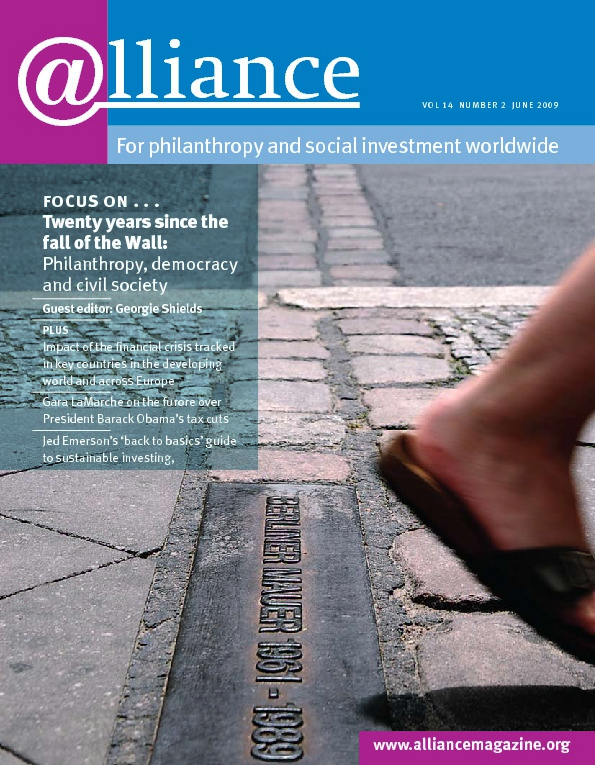Independent think-tanks in Central and Eastern Europe have been credited with keeping reform agendas alive during difficult times, challenging post-communist and new elites, and helping foreign specialists transform conceptual models into reforms tailored to local conditions.
Slovakia’s think-tanks have spearheaded a host of reform ideas – ranging from taxation to health care to anti-trust regulation – all of which were enthusiastically implemented once the pro-reform government took office in 1998, while Romania’s think-tanks grew into the most resolute actors on governance issues once Romania’s accession to the EU became feasible.
The Romanian Academic Society (SAR), for example, leading the NGO ‘Coalition for Clean Parliament’, forced the main political parties to scratch 98 candidates from their 2004 election lists because of corruption scandals or links to the communist regime. In Kosovo, Macedonia, Serbia and Albania, too, think-tanks have had notable successes in the last decade.
In spite of this, local demand for evidence-based policy research remains low owing to policy makers’ immaturity and lack of political will to include independent and evidence-based research in usually dysfunctional policy processes. Think-tanks such as the Agenda Institute in Albania, the Institute for Public Affairs in Slovakia and SAR in Romania, highly critical of their governments, rely almost solely on international support and non-governmental domestic sources.
To survive, many combine research and advocacy with other functions. For example, the Institute of Public Affairs in Poland has become one of the biggest think-tanks in the region by combining policy research with an intermediary regranting function, capacity building and academic research under the EU’s Research Framework Programmes. This hybrid nature has been both a blessing and a curse. While it has led to an understanding of the advantages and pitfalls of operating as an NGO or a consultancy, it has blurred think-tanks’ image and distracted them from what they do best: analysing policy.
Created in 2005 by the Open Society Institute, the Think Tank Fund (TTF) aims to support think-tanks to fulfil this role. Building on previous support by other OSI programmes and gradually concluding core support to organizations in the new EU member states and expanding in Western Balkans, Ukraine, Moldova and South Caucasus, the Fund provides tailored core grants. These allow think-tanks to consider their strategies, support developmental and innovative research, and explore new areas of work. The grantees thus enjoy greater freedom in setting their research agenda, and often engage in activities that raise new policy issues and push them on to the government’s general policy agenda. Equally important, think-tanks use these grants partly for internal development and capacity-building.
In 2006, the Fund introduced a special grantmaking line to develop policy responses to the tide of populism in the new EU member states. Topics included political party financing in Hungary, political representation in Latvia and monitoring governmental promises in Slovakia. Eventually, this modest funding allowed for exploration of some of the many cracks in the democratic system left behind after EU accession.[1]
Although modest in size (individual grants up to $75,000 per year), these projects have produced highly relevant and often unique analysis and policy recommendations on these sensitive issues. In the process, the Fund has learned that think-tanks achieve the best results when complementing credible research with well-thought advocacy efforts. Almost as a rule, successful advocacy is best achieved when teaming up with other watchdog organizations or membership NGOs.
In the past decade, influencing policy processes has become a standard part of donor support to the non-profit sector. While several international donors[2] have remained committed to think-tanks, this support must be continued and honed further. Important but prescriptive donors such as the European Commission have dictated agendas, leaving little space for local ownership. Given their countries’ diverging paths, key policy problems are best identified by locals. In addition to allowing more space for local ownership, donors should step up support for joint projects of think-tanks and advocacy organizations. For independent donors with declining regional budgets, initiating new policy ideas and fixing a critical eye on government implementation might offer the best return on investment.
Goran Buldioski is Executive Director of the Think Tank Fund. Email gbuldioski@osi.hu
1 CEE Trust is the only other donor that supports similar projects.
2 To name a few: the Balkan Trust for Democracy, the Black Sea Trust, National Endowment for Democracy, CEE Trust and the Think Tank Fund.





Comments (0)